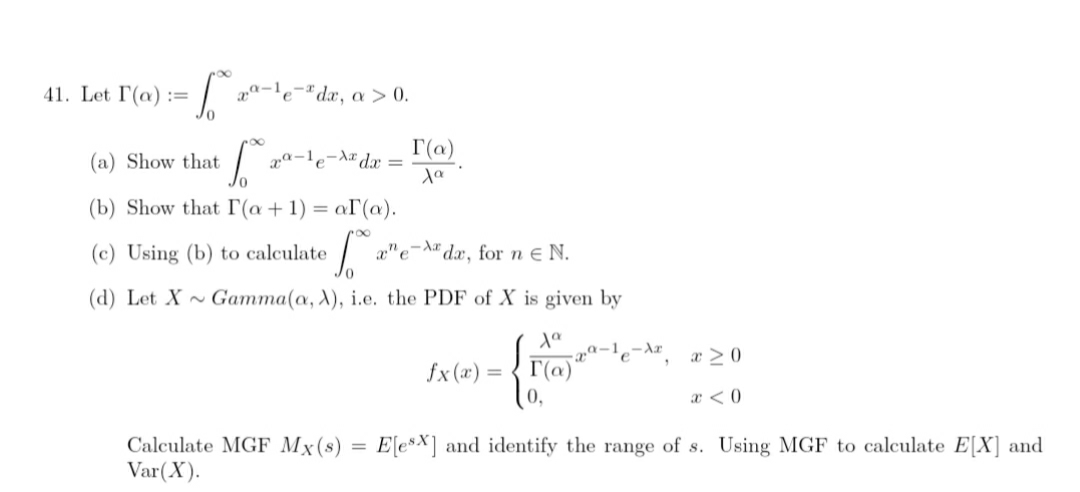
Question and Answers Forum
Question Number 74503 by crystal0207 last updated on 25/Nov/19

Commented by mathmax by abdo last updated on 25/Nov/19
![a)∫_0 ^∞ x^(α−1) e^(−λx) dx =_(λx=t) ∫_0 ^∞ ((t/λ))^(α−1) e^(−t) (dt/λ) =(1/λ^α )∫_0 ^∞ t^(α−1) e^(−t) dt =(1/λ^α )×Γ(α) ( λ>0) b) Γ(α+1) =∫_0 ^∞ x^α e^(−x) dx and by parts u=x^α and v^′ =e^(−x) Γ(α+1) =[−x^α e^(−x) ]_0 ^∞ +∫_0 ^∞ αx^(α−1) e^(−x) dx =αΓ(α) c)∫_0 ^∞ x^n e^(−λx) dx =∫_0 ^∞ x^(n+1−1) e^(−λx) dx =((Γ(n+1))/λ^(n+1) ) Γ(n+1)=nΓ(n−1) =n(n−1)Γ(n−2)=n!Γ(1) Γ(1)=∫_0 ^∞ e^(−x ) dx =[−e^(−x) ]_0 ^(+∞) =1 ⇒∫_0 ^∞ x^n e^(−λx) dx =((n!)/λ^(n+1) )](Q74541.png)
| ||
Question and Answers Forum | ||
Question Number 74503 by crystal0207 last updated on 25/Nov/19 | ||
 | ||
Commented by mathmax by abdo last updated on 25/Nov/19 | ||
![a)∫_0 ^∞ x^(α−1) e^(−λx) dx =_(λx=t) ∫_0 ^∞ ((t/λ))^(α−1) e^(−t) (dt/λ) =(1/λ^α )∫_0 ^∞ t^(α−1) e^(−t) dt =(1/λ^α )×Γ(α) ( λ>0) b) Γ(α+1) =∫_0 ^∞ x^α e^(−x) dx and by parts u=x^α and v^′ =e^(−x) Γ(α+1) =[−x^α e^(−x) ]_0 ^∞ +∫_0 ^∞ αx^(α−1) e^(−x) dx =αΓ(α) c)∫_0 ^∞ x^n e^(−λx) dx =∫_0 ^∞ x^(n+1−1) e^(−λx) dx =((Γ(n+1))/λ^(n+1) ) Γ(n+1)=nΓ(n−1) =n(n−1)Γ(n−2)=n!Γ(1) Γ(1)=∫_0 ^∞ e^(−x ) dx =[−e^(−x) ]_0 ^(+∞) =1 ⇒∫_0 ^∞ x^n e^(−λx) dx =((n!)/λ^(n+1) )](Q74541.png) | ||